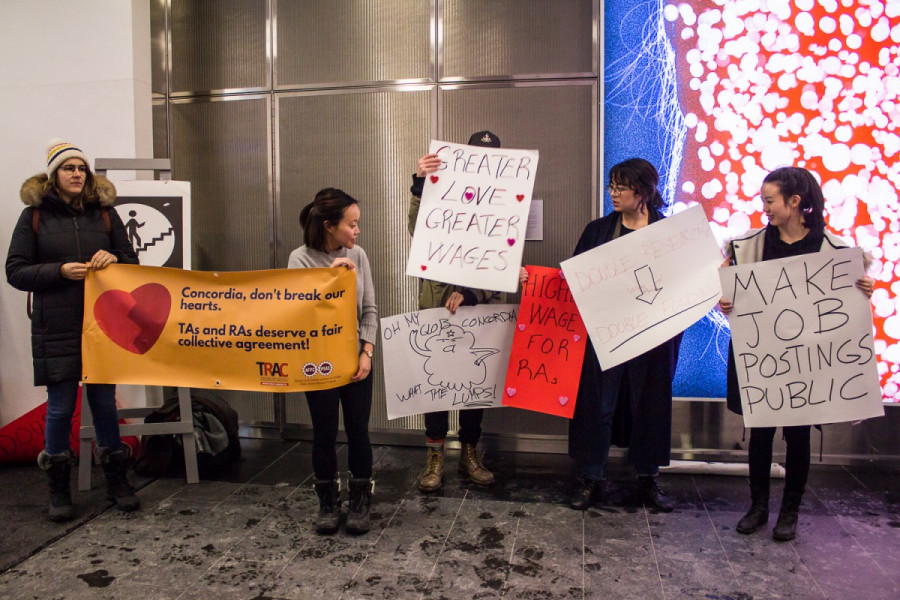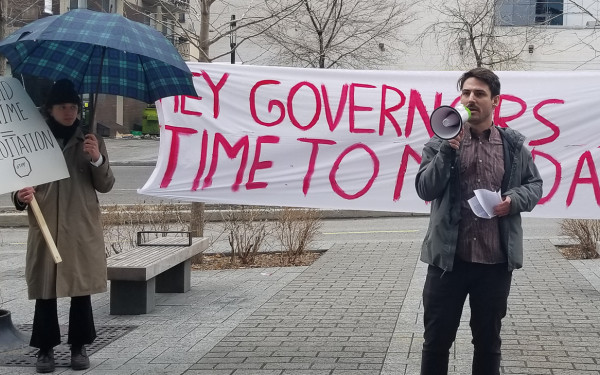Concordia Board of Governors: University Won’t Share Sexual Misconduct Task Force Applications
$1.9M Research Space to Open Next Fall, TA and RA Union Make Demands Heard
The Concordia Student Union won’t be getting the applications that have already been submitted to the university’s Task Force on Sexual Misconduct and Sexual Violence.
This article has been updated.
At a Board of Governors meeting on Thursday, student governor and CSU Student Life Coordinator Leyla Sutherland asked whether the union can expect to receive the applications from undergraduate students that were submitted before the university ceded responsibility for nominating students to the task force.
Concordia President Alan Shepard explained at the meeting that they will not be forwarding the applications due to the sensitive and personal nature of some the content of the applications. He also said this was explained in a letter sent to the CSU by Deputy Provost Lisa Ostiguy. They have since received the names of those who applied to the university, Sutherland confirmed Monday.
Shepard said that applicants have been told to re-apply directly to the CSU. The union will be reaching out to those who applied directly to the university, and will be accepting applications via email to appointments@csu.qc.ca until Feb. 16 at 5 p.m. More information can be found on their website.
$1.9 Million “4th Space” to Open This Fall
A new research area, titled the 4th Space, will be opening on Concordia’s downtown campus this fall, explained Nadia Bhuiyan, vice-provost of partnerships and experiential learning.
Taking over the former bookstore’s first floor space on the corner of De Maisonneuve Blvd. and Mackay St., the $1.9 million dollar space will be able to accommodate many of the university’s researchers for events, exhibitions, and hands-on learning, Bhuiyan said.
The vision for the space, she said, will be to “engage the city, engage the community.”
Some examples of possible uses included the space’s ability to drain water for agricultural studies, and the grid in the ceiling that can be used for suspended circus performances. There will also be a screen that will be visible from the street for a “night cinema” to showcase the research that can’t be brought into the space.
TA and RA Union Make Demands Heard

President of TRAC, Alexandre St-Onge-Perron, hopes negotiations over their collective agreement for teaching assistants and research assistants will improve as they start to put more pressure on the board of governors.
TRAC has been without a collective agreement since April 30, 2016. Their new one will be retroactive, spanning the 2016-2017 academic year until the 2018-2019 academic year.
The main issue is that since the summer, teaching assistants and research assistants have been having their contracts split. Hours spent grading are paid less than those spent teaching in the classroom.
“They say they want to double their research, well they should make sure their research assistants are getting a fair wage, which is not the case right now, especially for undergrads,” said St-Onge-Perron.
Right now undergraduate research assistants are paid $14.09 an hour. TRAC hopes to see their wages improve, so they’re paid at least $15 an hour instead.
Beyond that, they hope mechanisms can be put in place ensure that overtime is properly compensated. Right now, Grievance Officer Jeremy Tessier said he often hears complaints from members who say their their overtime isn’t paid or that their hours have been drastically cut.
In his own experience, Tessier saw his contract in the Geography and Planning Department go from being 130 hours per semester the year before to 65 hours when he returned for his third year.
“We end up doing unpaid overtime because the hours are cut but the work remains the same,” Tessier said.
President Shepard explained to the board that conciliation is underway with the union, but that it was “not appropriate to make a comment [on the negotiations] in an open setting.”

_900_675_90.jpg)



__600_375_90_s_c1.jpg)
_600_375_90_s_c1.jpg)
_600_375_90_s_c1.jpg)